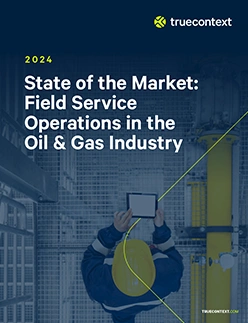How Mobile Technology and Digitization Can Increase Engagement in the Frontline
The oil and gas industry, one of the largest and most complex sectors in the world, faces a unique set of challenges. With global revenue reaching an estimated $5.3 trillion in 2023, the sector continues to grow despite macroeconomic challenges. However, this growth does not come without significant hurdles. Among these challenges, low employee engagement stands out as a critical issue that needs urgent attention.
Understanding Low Employee Engagement
Employee engagement is a crucial factor in the success of any organization. Engaged employees are more productive, have higher job satisfaction, and are less likely to leave their jobs. According to Gallup, companies with high levels of engaged employees experience 43% lower turnover, 64% fewer safety incidents, 23% higher profitability, and 18% higher productivity than those with low employee engagement. Despite these compelling statistics, the oil and gas industry struggles with maintaining high levels of engagement among its field service engineers (FSEs).
Sources of Friction
Friction in the workplace, such as inefficient processes and inadequate access to knowledge, tools, or equipment, is a significant contributor to low employee engagement. The 2023 Voice of the Field Service Engineer survey found that over half (52%) of oil and gas FSEs identified paperwork and administrative tasks as their least favorite aspect of the job. Additionally, nearly one in four (22%) reported that time spent looking for information was a major frustration. These issues are not unique to the oil and gas sector but are prevalent across all field service verticals.
The Impact of Remote and Intensive Work Environments
Field service operations in the oil and gas industry often take place in remote and hard-to-access locations. This exacerbates the impact of any field service disturbances, which can be highly disruptive to production schedules and significantly expensive. The remote nature of the work complicates access to offsite systems of record, creating gaps between the technician’s planned workflow and optimal workflow upon assessing live conditions. This increases dependency on field engineers’ expertise, which is particularly challenging amid the ongoing talent crisis.
Furthermore, the oil and gas sector is a highly regulated environment, both within the United States and globally. The constantly evolving nature of policies and regulations, driven by the global shift towards carbon neutrality, adds another layer of complexity to field service operations.
Leveraging Technology for Higher Front Line Engagement
Despite the challenges, there is a silver lining. The oil and gas industry is beginning to embrace digital transformation, and technology plays a crucial role in mitigating the issues contributing to low employee engagement. Field service engineers in the sector are eager to adopt technology, more so than their counterparts in other industries. According to the 2023 Voice of the Field Service Engineer survey, 65% of FSEs agree that available technology makes their job easier, compared to 56% across all verticals.
The Role of Mobile Apps and Digitization
Mobile technology is a game-changer for field service operations. When asked about the impact of mobile technology, a significant majority of FSEs in the oil and gas industry responded positively:
- 80% say it makes them more efficient.
- 76% say it makes them more productive.
- 79% say it makes them more independent.
- 69% say it makes them better engineers.
- 62% say it makes them safer engineers.
These statistics highlight the transformative potential of mobile apps and digitization in enhancing employee engagement. Mobile apps provide field service engineers with real-time access to the latest asset readings, historical maintenance data, and troubleshooting intelligence, regardless of their location. This not only reduces the time spent looking for information but also ensures that engineers have the necessary data to perform their tasks efficiently and effectively.
Reducing Administrative Burden
One of the primary sources of frustration for FSEs is the administrative burden associated with their job. Automation technology can significantly reduce this burden by streamlining administrative tasks and paperwork. By automating routine tasks, field service engineers can focus more on what they enjoy—solving customer problems and fixing equipment. This shift not only enhances job satisfaction but also improves overall productivity.
Enhancing Training and Onboarding
The talent crisis in the oil and gas industry is exacerbated by the retirement of seasoned engineers, leading to a loss of valuable knowledge and expertise. Automation technology can help bridge this gap by providing guided workflows and training modules for new engineers. This not only accelerates the onboarding process but also reduces the reliance on veteran workers to support newcomers, thereby alleviating some of the pressure on experienced engineers.
Ensuring Safety and Compliance
In a highly regulated sector like oil and gas, ensuring safety and compliance is paramount. Mobile apps and digitization can provide field service engineers with real-time access to the latest compliance guidelines and safety protocols. Guided mobile workflows can help ensure that all tasks are performed accurately and in accordance with regulatory requirements, reducing the risk of human error and enhancing overall safety.
Conclusion
The oil and gas industry is at a critical juncture. To address the issue of low employee engagement, it is imperative to leverage technology, mobile apps, and digitization. By reducing administrative burdens, enhancing training and onboarding, and ensuring safety and compliance, technology can significantly improve job satisfaction and productivity among field service engineers. As the industry continues to navigate macroeconomic challenges and regulatory pressures, embracing digital transformation will be key to future-proofing organizations and driving long-term success.
If you’d like to know more about how TrueContext can help your oil & gas organization better engage your frontline workers, please reach out to us.





